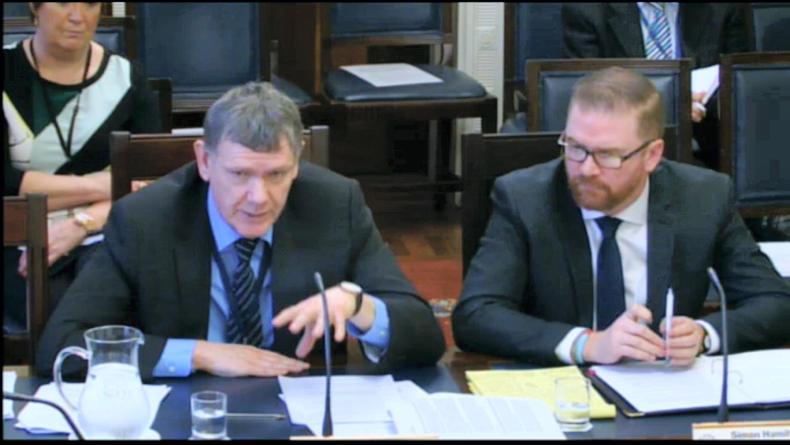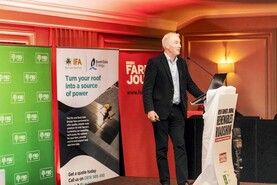Under the plan announced by Minister Hamilton at the Economy Committee on Monday, all RHI claimants will move to the tiered and capped tariff rates introduced after November 2015.
This will apply for one year from the beginning of the 2017/18 financial year. A consultation will then be launched for a long-term solution to the overspend from the RHI scheme.
For biomass boilers between 19kWth to 199 kWth in size, the plan will involve a 6.5p/kWh tariff paid for the first 1,314 hours of heat produced each year with 1.5p/kWh paid after this up to an annual cap of 400,000 kWh.
Under the original scheme introduced in November 2012, tariffs were paid at a flat rate and were uncapped.
Minister Hamilton said that the plan will reduce the cost of the scheme to around £25m for the 2017/18 year. The UK Treasury contribution stands at around £22.5m meaning the annual overspend being covered by the NI Executive reduces from around £30m to £2.5m.
Minister Hamilton added that a tender for additional resources to carry out inspections of all RHI accredited boilers will be launched soon and that this audit process would reduce scheme costs further.
Contracts
Several MLAs on the committee raised questions about changing the scheme tariffs that were originally agreed for 20 years with boiler owners in contracts.
Minister Hamilton said that changes to tariffs would see an annual return on investment of around 12% which was “consistent with the original intentions of the scheme.”
Miscalculations in boiler running costs by consultants in 2012 meant that tariffs paid were higher than actual running costs. Minister Hamilton said on Monday that some boilers have a return on investment of between 30% to 50% under the original tariffs.
However, Minister Hamilton stated that he expected the regulations to meet a legal challenge.
Challenge
The Renewable Heat Association Northern Ireland was formed last week and aims to represent renewable heat stakeholders paying a membership fee.
Meanwhile, in a letter from a solicitor representing RHI participants and sent to the Department for the Economy and all MLAs, changes to the scheme are described as “likely to be unlawful” and “must be subject to a rigorous consultation process”.
However, a speedy passage through the Assembly is now required for the proposed plan with the Assembly set to be dissolved later on Monday and an election called following Martin McGuiness’ resignation as Deputy First Minister last week.
Sinn Fein did not nominate a replacement for Martin McGuinness in the Assembly chamber on Monday afternoon and the party's MLAs on the Economy Committee, including committee chairman Conor Murphy, did not attend the meeting on Monday morning.
Further updates on the changes to the RHI scheme will follow on www.farmersjournal.ie.
Read more
The cash for ash scheme explained
Full coverage: RHI
Under the plan announced by Minister Hamilton at the Economy Committee on Monday, all RHI claimants will move to the tiered and capped tariff rates introduced after November 2015.
This will apply for one year from the beginning of the 2017/18 financial year. A consultation will then be launched for a long-term solution to the overspend from the RHI scheme.
For biomass boilers between 19kWth to 199 kWth in size, the plan will involve a 6.5p/kWh tariff paid for the first 1,314 hours of heat produced each year with 1.5p/kWh paid after this up to an annual cap of 400,000 kWh.
Under the original scheme introduced in November 2012, tariffs were paid at a flat rate and were uncapped.
Minister Hamilton said that the plan will reduce the cost of the scheme to around £25m for the 2017/18 year. The UK Treasury contribution stands at around £22.5m meaning the annual overspend being covered by the NI Executive reduces from around £30m to £2.5m.
Minister Hamilton added that a tender for additional resources to carry out inspections of all RHI accredited boilers will be launched soon and that this audit process would reduce scheme costs further.
Contracts
Several MLAs on the committee raised questions about changing the scheme tariffs that were originally agreed for 20 years with boiler owners in contracts.
Minister Hamilton said that changes to tariffs would see an annual return on investment of around 12% which was “consistent with the original intentions of the scheme.”
Miscalculations in boiler running costs by consultants in 2012 meant that tariffs paid were higher than actual running costs. Minister Hamilton said on Monday that some boilers have a return on investment of between 30% to 50% under the original tariffs.
However, Minister Hamilton stated that he expected the regulations to meet a legal challenge.
Challenge
The Renewable Heat Association Northern Ireland was formed last week and aims to represent renewable heat stakeholders paying a membership fee.
Meanwhile, in a letter from a solicitor representing RHI participants and sent to the Department for the Economy and all MLAs, changes to the scheme are described as “likely to be unlawful” and “must be subject to a rigorous consultation process”.
However, a speedy passage through the Assembly is now required for the proposed plan with the Assembly set to be dissolved later on Monday and an election called following Martin McGuiness’ resignation as Deputy First Minister last week.
Sinn Fein did not nominate a replacement for Martin McGuinness in the Assembly chamber on Monday afternoon and the party's MLAs on the Economy Committee, including committee chairman Conor Murphy, did not attend the meeting on Monday morning.
Further updates on the changes to the RHI scheme will follow on www.farmersjournal.ie.
Read more
The cash for ash scheme explained
Full coverage: RHI






 This is a subscriber-only article
This is a subscriber-only article











SHARING OPTIONS: